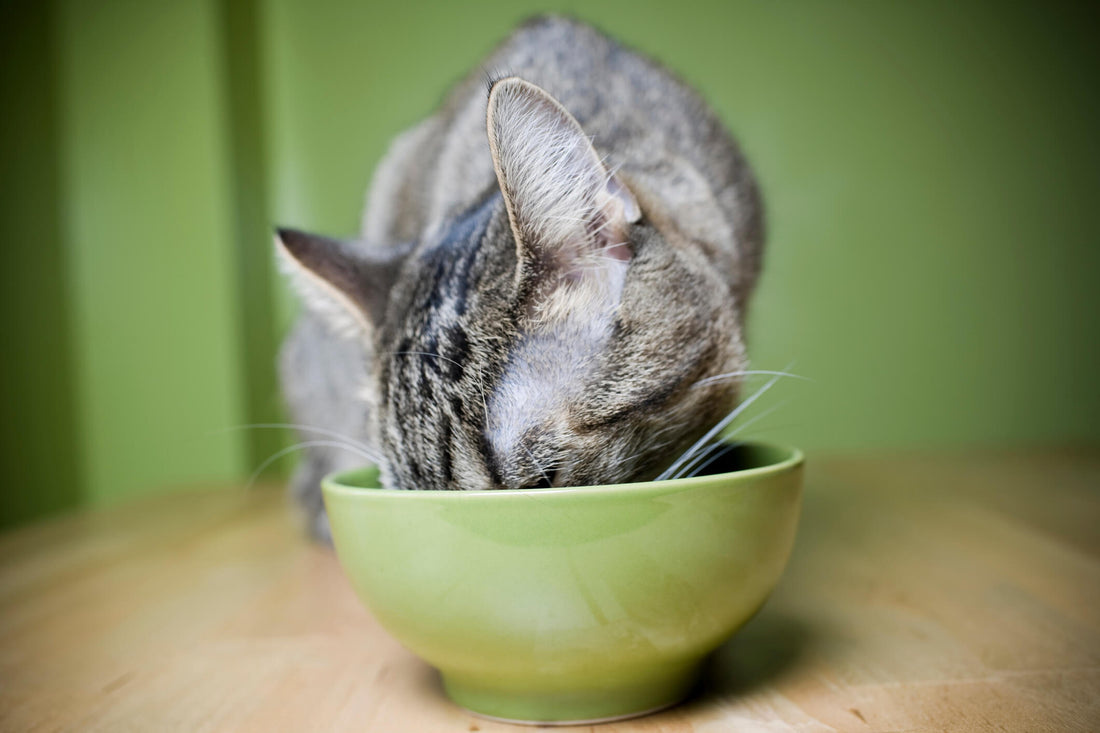
How Nutrition Can Help Manage Your Cat's Hyperthyroidism
Feline hyperthyroidism—an abundance of thyroid hormone in a cat’s body—is a relatively common condition that causes behavioral and health changes in our furry friends. One of the ways pet parents spot this condition in their cats is by noticing their kitty’s ravenous appetite and persistent begging. But aside from being an indicator of illness, food can also be part of your hyperthyroid cat’s treatment plan.
Hyperthyroidism is caused by an abnormality in the small gland in your cat’s neck called the thyroid. An overactive thyroid produces more thyroid hormone than necessary and spikes your cat’s metabolism, forcing their body to burn energy faster. This is why so many cats with hyperthyroidism eat lots of food but lose weight.
Two of the most popular treatments for feline hyperthyroidism are medication and surgery. Medication can alter the thyroid, reducing the amount of thyroid hormone it produces to bring it back down to normal levels. Surgery may be done on the thyroid to remove all or some of the gland, since the condition is often caused by a benign thyroid tumor.
Unfortunately, these two options aren’t the right choices for all cats. Some cats’ bodies may not be capable of handling a lifetime of medications, while others aren’t strong enough to undergo surgery. A third treatment, radioactive iodine therapy, might not be accessible to all families due to cost or location.
An alternative treatment option is to manage your cat’s hyperthyroidism through dietary changes. Nutrition-based hyperthyroidism treatment is still being studied by experts, so it’s very important that you not make any changes to your pet’s diet before consulting your veterinarian. Here’s what you should know.
Iodine-restricted diet
Iodine, a mineral needed by the body that is often found in salt and seafood, is a key player in your cat’s production of thyroid hormone. Without iodine, the thyroid cannot produce hormones. Therefore, some experts believe that iodine restriction can reduce the amount of hormones produced by the thyroid, counteracting the gland’s overproduction.
Some pet food companies have created a specially formulated prescription cat food with very low iodine content to aid in this type of treatment. Cats who are fed this diet should only eat it—meaning no treats or table scraps—or else their iodine levels could be skewed.
It’s possible that cats who are fed an iodine-restricted diet will see improvement in their hyperthyroidism symptoms within a few weeks without any other type of treatment. This might be a great, non-invasive solution to your kitty’s thyroid troubles. However, researchers are still exploring the effects of long-term iodine restriction in cats and whether this practice will affect their health over time.
Other supportive diets for hyperthyroidism
Diet and nutrition can also be used to support your cat if they are undergoing other types of treatment for hyperthyroidism. If your pet is taking medication or undergoing radioactive iodine therapy, an iodine-restricted diet will not be appropriate. Talk to your vet to see whether the following changes are right for your pet, instead:
- Canned food: Canned food is often better for cats with hyperthyroidism than dry food because it contains additional water that offsets the cat’s excessive thirst. Hyperthyroidism can make cats overproduce urine, forcing them to drink more to avoid dehydration.
- High-protein food: Because hyperthyroidism causes your cat’s body to metabolize food quickly, zapping their energy, it’s important to feed them a diet that will bolster their energy levels longer, even if they’re in treatment. Food higher in protein can help your kitty retain their energy levels and regain lost weight and muscle mass.
- Herbal supplements: Supplements designed for thyroid support use a blend of herbs that encourage healthy and normal activity of the thyroid gland. They also tend to support the areas of the body most commonly affected by consistently high thyroid hormone levels, including the heart and nervous system. These supplements might not be the right choice for pets actively taking medication, but they may be useful in combination with other therapies or during periods where your cat is not taking medication. Make sure to discuss any supplements with your vet before giving them to your pet!
Without treatment, hyperthyroidism will continue to take its toll on your cat’s entire body, from their muscles, to their kidneys, to their metabolic processes. Although it may not be a cure, feeding your cat a special diet—whether it’s iodine-restrictive or merely supportive—can aid in your cat’s recovery and help manage the disease long-term. Consult with your vet about your cat’s dietary options for hyperthyroidism to find the perfect plan for them.


